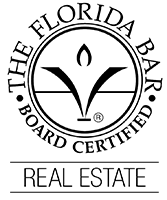Disclaimer Wording in As-Is Real Estate Contracts
Disclaimer clauses are common in contracts for sale of real estate, especially in as-is contracts. An as-is contract generally favors the seller by including wording that limits the seller’s liability to the buyer. For example, the contract might say that the real property is being sold as-is and without any warranties by the seller. It might go on to say that the buyer has not relied upon any statement regarding the property or its condition. Disclaimer clauses vary in length, title, and enforceability.
There is no magic form of disclaimer clause wording for as-is contracts in Florida, but a 2022 Pinellas County, Florida case shows the importance of contract drafting (and contract reading) and what can happen if certain words are missing in a disclaimer.
In NM Residential, LLC v. Prospect Park Development, LLC, 336 So.3d 807 (Fla. 2d DCA 2022), the Pinellas County trial court dismissed a lawsuit that made fraud claims arising from a purchase and sale agreement, basing the dismissal on the as-is disclaimer clause in the contract, but the appellate court reversed because “Florida Supreme Court precedent requires that to foreclose liability for fraud the parties must expressly stipulate that any fraud that might have been committed cannot form the basis of a claim.”
The court quoted Oceanic Villas, Inc. v. Godson, 4 So.2d 689 (1941), and said, “[T]he contract must do more than merely agree ‘that no fraud had been committed’ — i.e., disclaim the making of fraudulent statements upon which the other party has relied — but must rather ‘recognize that fraud may have been committed and stipulate that such fraud, if found to have been committed, should not vitiate the contract.’”
Now that’s pretty strong wording to put into a contract that should be read by the buyer before it is signed. Would you sign a contract if it it had a disclaimer clause that said the other side is not liable even if it committed fraud, and that fraud might actually have been committed? I suppose this type of wording appears in website terms of service agreements and other types of contracts that we all “agree” to every day, but selling real estate seems to me to call for a higher level of mutual agreement.
And, I think this case stands for that concept: if you want the buyer in a Florida real estate deal to be prevented from suing the seller for fraud, then the contract disclaimer clause needs to make it clear that there might have been fraud, and even if so, the buyer waives that fraud claim.
Maybe this is another one of those peculiarities in Florida law.
The bottom line: we need to both read and draft our disclaimer clauses in as-is contracts for sale of Florida real estate very carefully. Perhaps it’s the first clause to read, right after the price.
For additional information, see the free ebook “Florida Real Estate Sales Contracts” by Florida Bar Board Certified Real Estate Lawyer James W. Martin.






